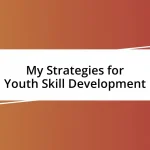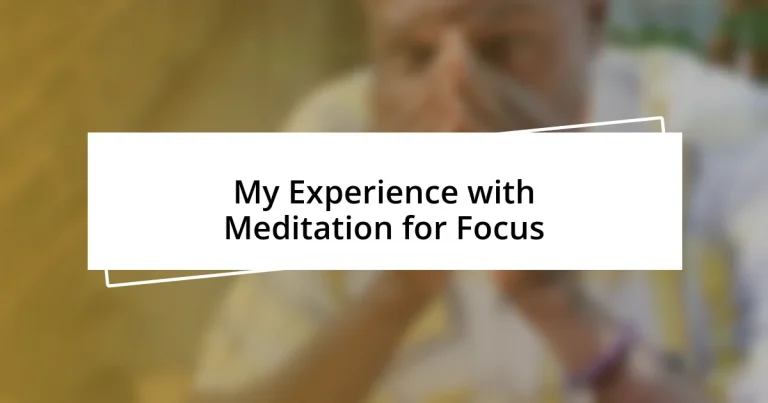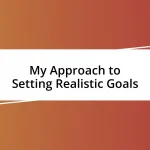Key takeaways:
- Meditation enhances focus and mental resilience by training attention and reducing distractions.
- Finding the right meditation technique is personal and can significantly improve one’s experience and effectiveness.
- Measuring progress in meditation involves recognizing subtle shifts in focus and emotional responses, rather than just the duration of practice.
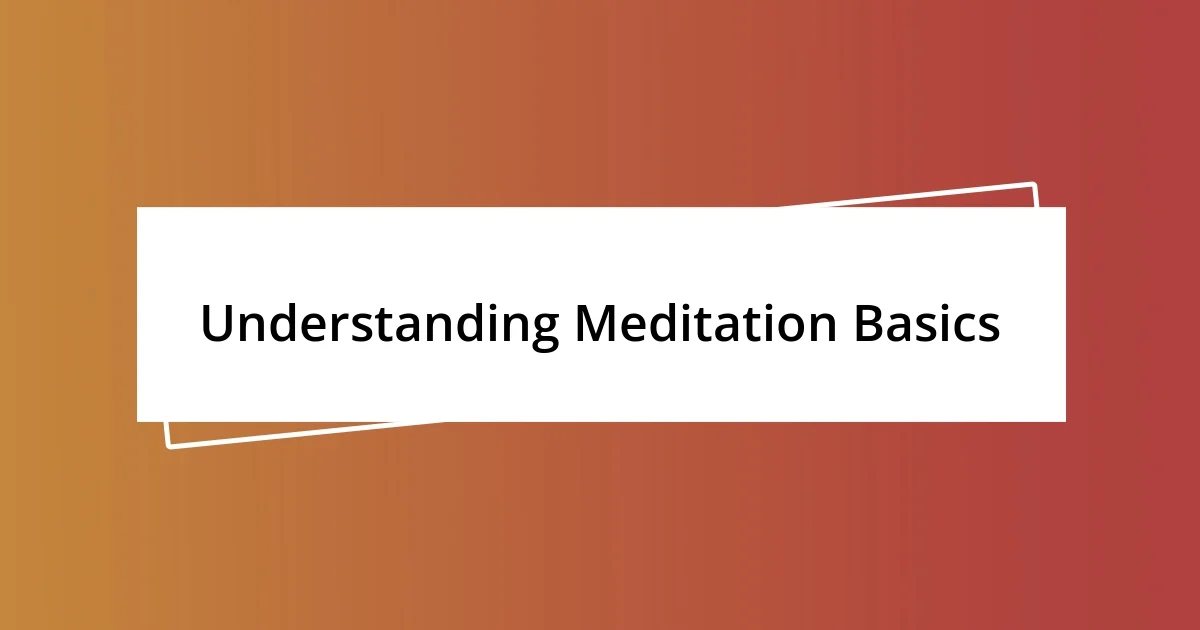
Understanding Meditation Basics
Meditation, at its core, is about finding stillness in the chaos of our minds. Personally, I remember sitting down for the first time, enveloped in a whirlwind of thoughts—grocery lists, work deadlines, and reminders buzzing like bees. Isn’t it fascinating how, in just a few minutes of focused breathing, I could feel that chaos slowly transform into a serene clarity?
One of the basic techniques involves simply observing your breath. I often find myself counting each inhale and exhale, a small act that feels grounding. Can you recall a moment when you paused to appreciate a simple occurrence, like watching a leaf float down? That’s the essence of meditation—pausing to reconnect with the present moment, allowing distractions to fade into the background.
As I delved deeper into meditation, I realized it’s not just about silence; it’s about awareness. Emotions can bubble up unexpectedly, and I’ve learned to welcome them without judgment. Have you ever felt like your feelings were too intense to handle? Meditation teaches us to sit with those feelings, observe them, and ultimately understand that they’re just passing visitors in our minds.
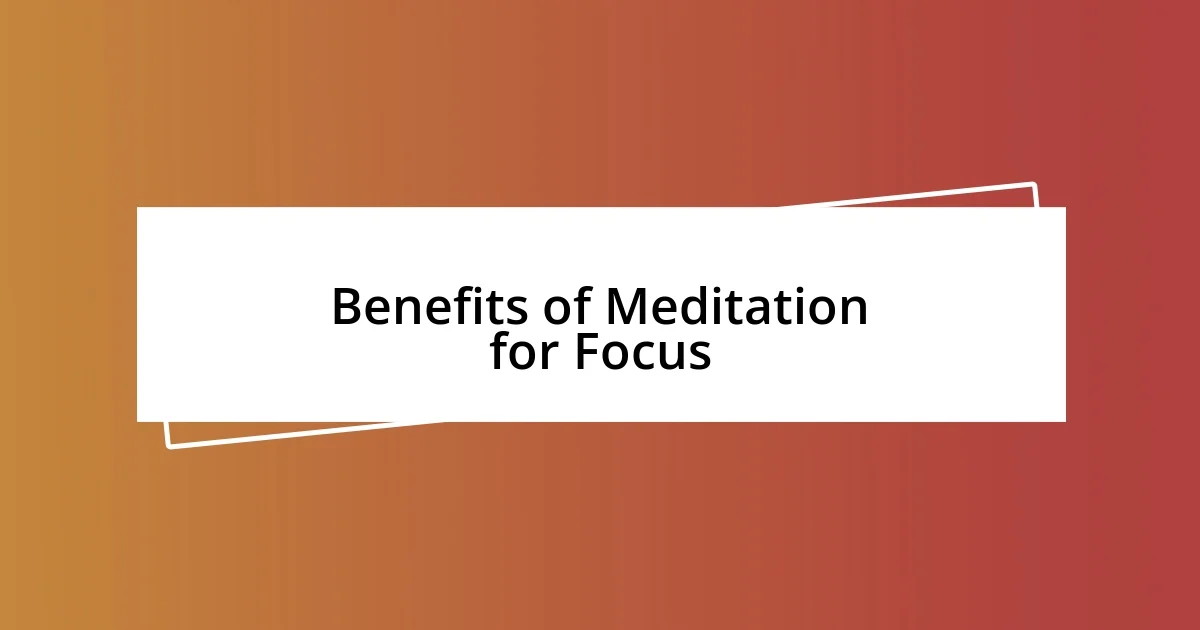
Benefits of Meditation for Focus
Meditation has significantly enhanced my ability to focus by sharpening my attention span. I often remember those initial sessions where my mind darted from one thought to another like a pinball machine. Over time, as I dedicated myself to daily practice, I noticed that I could sustain my focus on tasks for much longer periods. Have you ever finished a project and felt the rush of accomplishment? That’s how I feel when I complete tasks with clarity and purpose, a testament to the power of meditation in fine-tuning my concentration.
Another significant benefit I’ve experienced is a refined ability to eliminate distractions. It’s almost like training a muscle; the more I sat in meditation, the stronger my ability to redirect my attention became. I recall encountering a noisy environment, and instead of feeling overwhelmed, I found comfort in focusing my breath and grounding myself. It’s fascinating how what once felt distracting has transformed into a mere background hum, allowing me to hone in on what truly matters.
Moreover, meditation fosters a sense of mental resilience. I remember instances where stress threatened to overwhelm my focus during critical moments, but through my practice, I learned to recalibrate my thoughts. Each breath became a tool for steering my focus back on track, teaching me that interruptions are not failures but opportunities to start afresh. Isn’t it empowering to realize that our minds can be trained, just like our bodies?
| Benefit | Personal Experience |
|---|---|
| Enhanced Attention Span | Daily practice led to longer focus periods on tasks, transforming pinball thoughts into clarity. |
| Distraction Elimination | Encountering noise became an opportunity; redirecting my focus through breath allowed me to maintain concentration. |
| Mental Resilience | Faced stress during critical moments, but learned to recalibrate my thoughts, turning interruptions into fresh starts. |
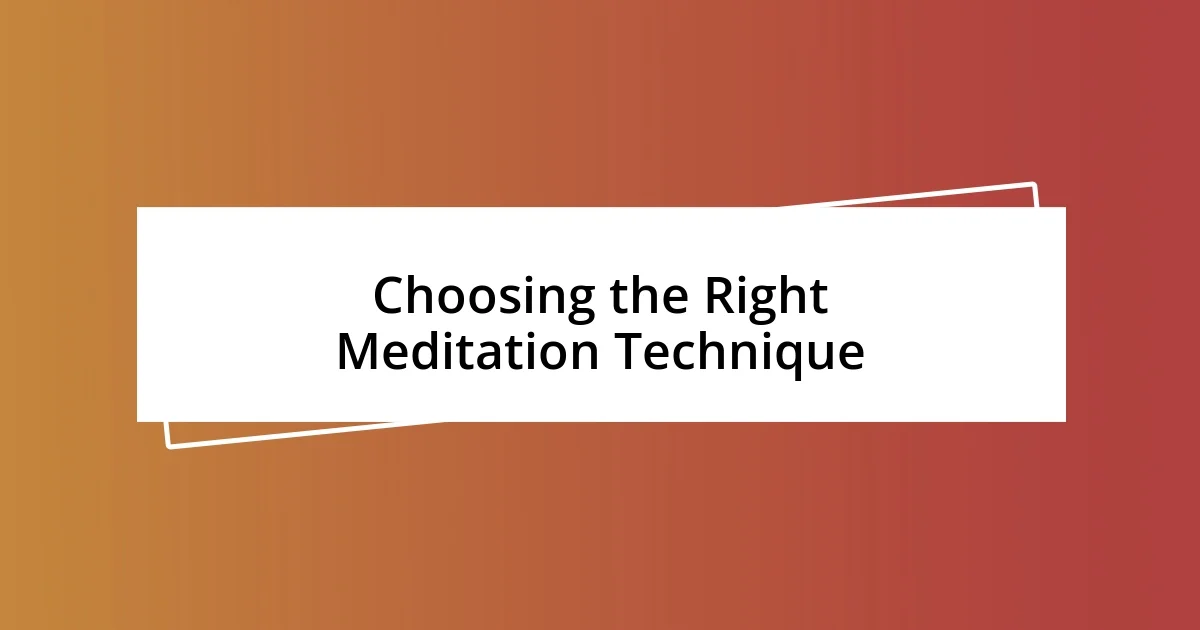
Choosing the Right Meditation Technique
Choosing the right meditation technique depends on personal preferences and experiences. When I first explored meditation, I tried a few different approaches before finding my fit. For example, loving nature, I was drawn to guided meditations that incorporated sounds of wind and birds. They made me feel connected to the earth while still centering my mind. If you’re unsure where to start, consider the following techniques:
- Breath Awareness: Focus on your breath, noticing the sensations, and let your thoughts come and go without judgment.
- Body Scan: Progressively relax different parts of your body, bringing awareness to sensations and easing tension.
- Visualization: Picture a calming scene or place, which helps transport your mind away from distractions.
- Mantra Repetition: Choose a word or phrase to repeat quietly, anchoring your thoughts and fostering a sense of peace.
Finding the right technique is like sifting through a treasure chest for the perfect gem. After experimenting, I stumbled upon yoga nidra. It’s a form of guided meditation that deeply relaxed me while keeping my focus sharp. I recall one evening, lying on my mat, as the instructor’s voice wrapped around me like a warm blanket. I felt every muscle release tension, and in that moment, clarity dawned on me—I could marry relaxation and focus. Even if you feel overwhelmed initially, stick with it; the right technique may surprise you with its ability to evolve and meet your needs as they change.
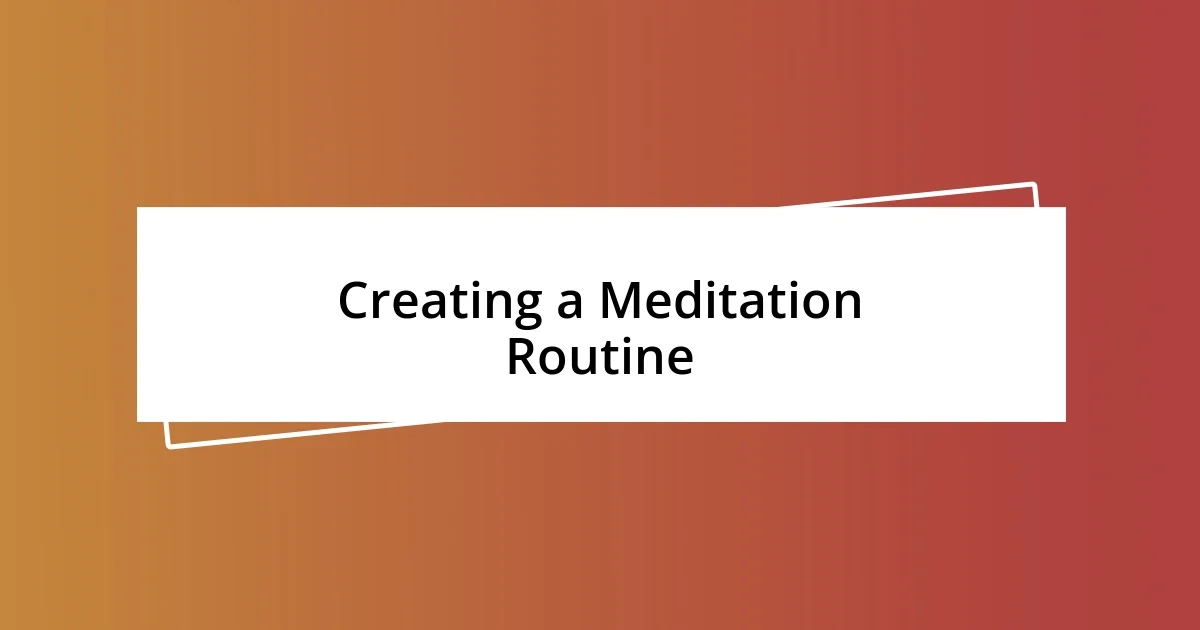
Creating a Meditation Routine
Creating a meditation routine has been an enlightening journey for me. At first, I struggled with when and how often to practice, but I found that consistency was key. I decided to set aside just ten minutes each morning, right after I woke up. This small commitment transformed my day; I felt more grounded and focused, almost like hitting a reset button before the daily chaos ensued. Have you ever noticed how a simple routine can set the tone for everything that follows?
As I progressed, I learned to tailor my routines to fit my mindset. Some days, I craved something more structured while other days felt better with a more spontaneous approach. For instance, on particularly tense mornings, I incorporated a few minutes of gentle stretching before I sat down to meditate. This blend not only calmed my body but also prepared my mind, making the meditation flow beautifully. Does your body need something different some days too?
The ambiance of my meditation space significantly impacted my experience. I intentionally selected a cozy corner in my home, adorned it with soft cushions, and lit a soothing candle. For me, that tactile transition from the chaos of the outside world to my serene little haven often felt like an invitation to breathe freely. Occasionally, I even played soft instrumental music. It became a ritual that I genuinely looked forward to; the warm glow and gentle sounds would envelop me, easing me into a sense of focus and tranquility. Have you created a space that feels like yours?
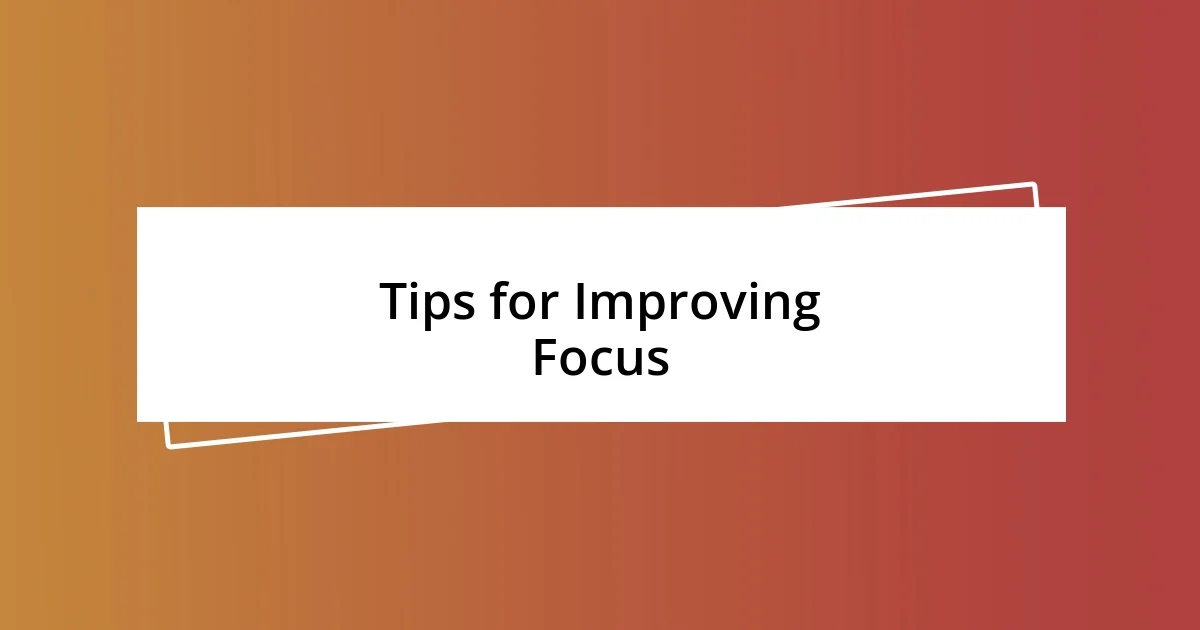
Tips for Improving Focus
Fostering a distraction-free environment has proven essential for enhancing focus. I vividly remember the time I decided to declutter my workspace. I removed all non-essential items, and that simple act created a sense of clarity in my mind. Have you ever noticed how physical clutter can create mental chaos? It’s fascinating how a clean space allows for an uncluttered mind, helping you stay present during meditation.
Incorporating short breaks into your routine can also work wonders. I’ve found that stepping away from my tasks for just a few minutes, whether to stretch or take a few deep breaths, rejuvenates my focus. These brief interludes act like a mental reset, preventing burnout. Can you recall a moment when a tiny break transformed your energy? It’s a refreshing reminder that sometimes, we really do need to pause to power forward.
Engaging fully in a particular task can improve your focus tremendously. I often set timers to dedicate myself entirely to a single activity, whether it’s writing or painting. This technique, known as the Pomodoro Technique, has helped me concentrate without feeling overwhelmed. It’s amazing how committing to just 25 uninterrupted minutes can lead to significant progress. What activities pull you in and hold your focus effectively? When you find that sweetness in concentration, it feels like time stands still, and productivity soars.
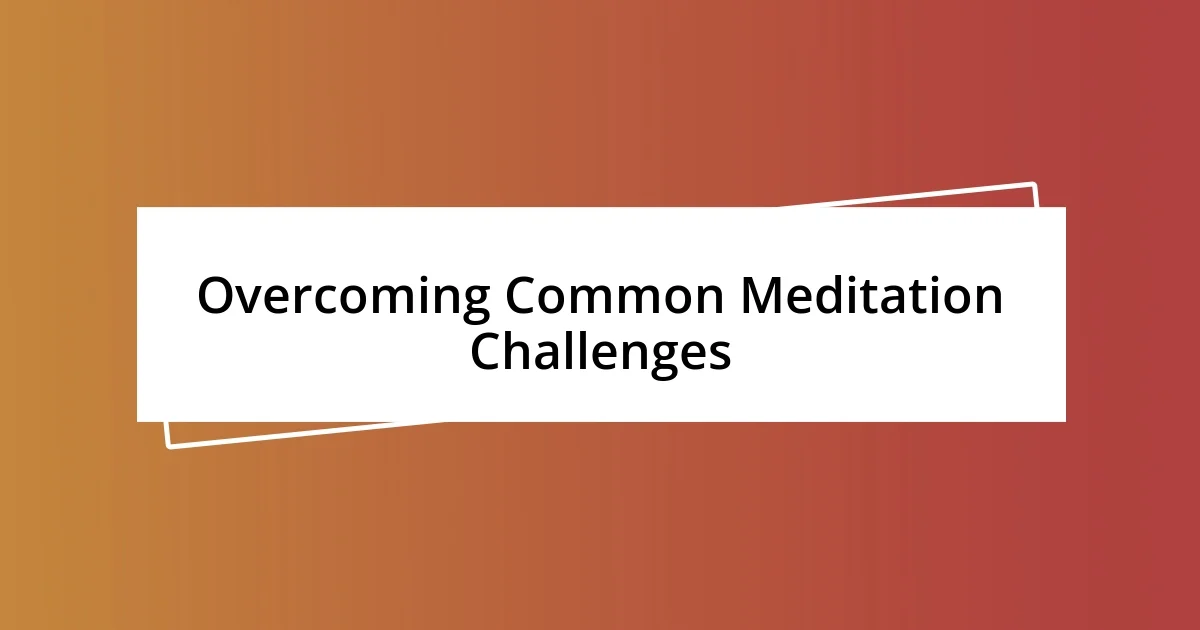
Overcoming Common Meditation Challenges
I can’t tell you how many times I found my mind wandering while trying to meditate. In those moments, I realized that acknowledging distractions was key. Instead of fighting against them, I began to treat my thoughts like clouds passing in the sky—acknowledged but not engaged with. Have you ever noticed how freeing it can be to simply let thoughts drift away?
Another challenge I faced was dealing with physical discomfort. I remember one session where my back ached so much that I could barely concentrate. That’s when I decided to experiment with different postures. I explored sitting on a cushion, leaning against a wall, and even trying a more relaxed position on my yoga mat. Finding a comfortable spot made a world of difference; it allowed me to let go of physical distractions. Have you found a position that resonates with your body?
Lastly, I encountered days where motivation seemed to disappear entirely. On those occasions, I would pull out a guided meditation that I knew I enjoyed. There’s something about hearing someone else’s voice guiding me that felt like a gentle nudge to reconnect. It reminded me that meditation doesn’t have to be an isolated journey; it can be shared and celebrated. Do you have a favorite meditation or mentor that inspires you to keep going?
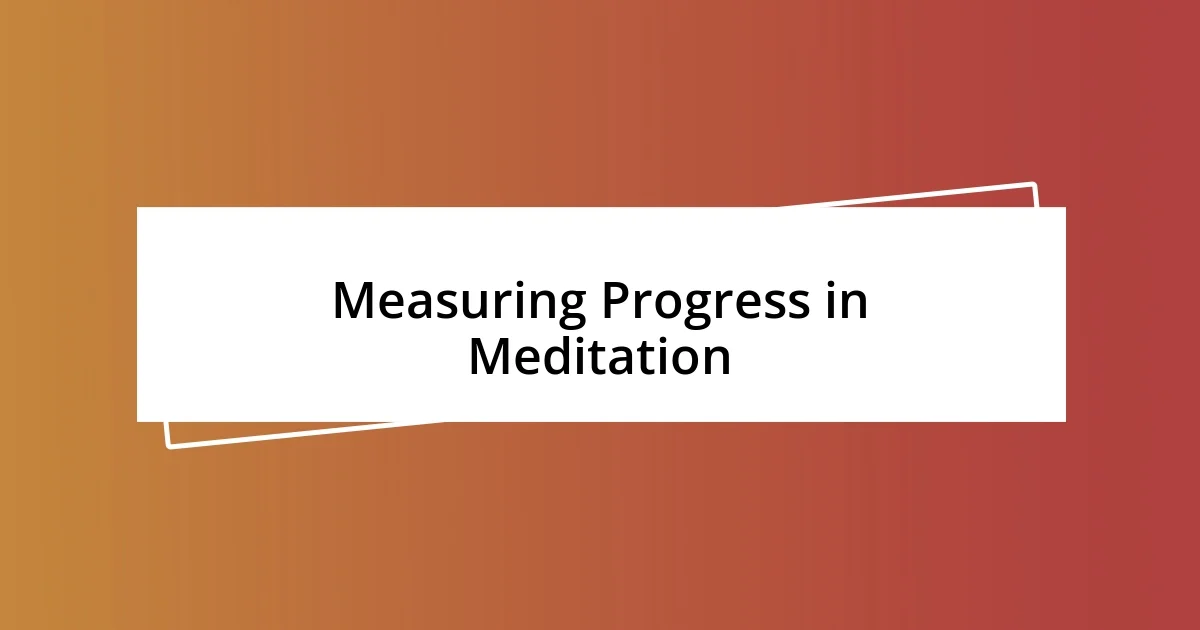
Measuring Progress in Meditation
Measuring progress in meditation can sometimes feel elusive. I remember my early days of practice when I was frustrated by my inability to see clear improvement. It wasn’t until I started journaling my experiences that I realized growth goes beyond just feeling calmer. Tracking the duration of my sessions and the clarity of my mind helped me recognize subtle shifts in my focus over time—like piecing together a beautiful puzzle.
Often, the progress I measured was more about quality than quantity. I can recall a time when I managed to stay present for just a minute longer than usual. That single minute felt like a monumental achievement. Have you ever noticed how these small victories can build momentum? Each time I experienced a fleeting moment of clarity, I marked it as progress, affirming that meditation is indeed a journey of self-discovery.
Another insightful avenue to gauge progress is through the emotional landscape that arises post-meditation. I vividly remember finishing a session one rainy afternoon, feeling an unexpected wave of gratitude wash over me. It was moments like these that became my barometer for progress. How do you feel after meditating? Emotions sometimes serve as powerful indicators that our mind is shifting, helping us understand that meditation transforms not just our focus but the overall experience of being present.








